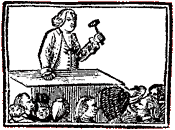“The Defendant...did not appear”
 Samuel Sewall, historian of Woburn, recorded a story of what happened when the Rev. Edward Jackson reopened his libel suit against the Rev. Josiah Cotton. But reading between the lines makes it clear that Sewall didn’t believe that tale. It had probably been reshaped over time for dramatic effect.
Samuel Sewall, historian of Woburn, recorded a story of what happened when the Rev. Edward Jackson reopened his libel suit against the Rev. Josiah Cotton. But reading between the lines makes it clear that Sewall didn’t believe that tale. It had probably been reshaped over time for dramatic effect.
In January 1753 the Massachusetts Superior Court had ruled Cotton justified in calling Jackson “a vile, wicked man, a fornicator, and unfit to be a minister.” Then in August, Jackson told the court he had new evidence. Here’s the tradition of what happened the following January, in Sewall’s words:
When the Court was assembled and ready to attend to the Review petitioned for, Mr. Jackson put the letter above referred to [see yesterday’s posting] into his Attorney’s hand. The lawyer [Edmund Trowbridge] shows it to its author, a leading man of the Fox [i.e., anti-Jackson] party, then present, and asks him if he knew and would own his own hand? The writer blushed and was confounded.How’s that for drama? Jackson vindicated! His rival in tears! His main accuser (probably Roland Cotton) blushing in embarrassment.
The cause being explained to Rev. Mr. Cotton, he ran out of the Court house, and cried like a child at perceiving how deceived or mistaken he had been.
But Jackson wasn’t the type to keep quiet about being vindicated for five months, even as his reputation suffered and his livelihood was at risk. During earlier controversies he’d been quick to take action against his critics.
Furthermore, as Sewall notes, the record of the Superior Court hearing in 29 Jan 1754 says:
The Defendant altho’ solemnly called to come into Court, did not appear, but made Default, and the Plaintiff (the Defendant having paid him the Costs) Releases his Demand for Damages.So by that winter date, Cotton had already paid Jackson his court costs, implying those two men had reached a private settlement. The hearing that Cotton didn’t attend was just a formality. (Jackson had already promised to forgo any damages for libel if Cotton would apologize.)
Instead of January 1754, it looks like the crucial breakthrough in this case occurred in August 1753.
TOMORROW: What folks in Woburn were up to that month.

2 comments:
With apologies to Arlo Guthrie:
... J.L. was making sure, and it was about four or five days later that Ebenezer (remember Ebenezer? It's a story about Ebenezer), Ebenezer came by ...
Kidding, sir; I'm loving it.
- Chris H.
I’m glad someone remembers Ebenezer Richardson!
Post a Comment